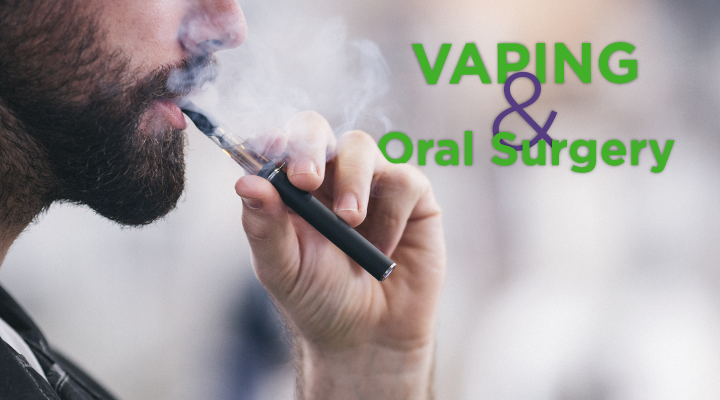
Preparing for dental surgery? It’s critical to a smooth recovery that your dentist is aware of your habits and lifestyle. Tobacco use, vapes, and e-cigarettes can make recovery and healing after dental surgery more difficult. Some think e-cigarettes are a safer alternative to smoking cigarettes. However, research suggests they could be even worse for our oral health than traditional cigarettes. In combination with dental surgery, e-cigarette and vape usage can be extremely harmful. Understand the risks and discuss with your dentist how to prepare for oral surgery as a smoker.
Nicotine and Dental Health
In 2017, 44% of individuals surveyed did not think e-cigarettes were harmful.Smoking makes you three times as likely to develop periodontal disease, and nicotine causes the breakdown of tissue in the mouth.
Nicotine is a major component of tobacco and reduces the amount of oxygen our vital organs and tissues receive. This makes the healing process, and the surgery itself, more dangerous. When oxygen isn’t circulating properly, it can increase your risk of developing an infection. Additionally, after surgery the action of drawing from the vape to inhale “can pull the clot from the extraction site and cause dry socket.” This is a very painful experience.
Nicotine can make it harder for our body to repair. Not only does it damage the tissue in the mouth, it also prevents wounds from healing normally. The American Association of NurseAnesthetists writes that vaping is no better than smoking when it comes to dental surgery. It increases the risks associated with anesthesia and can lead to other complications for surgery patients.
Being aware of the risks vapes and e-cigarettes pose to dental surgery is only half the battle. Don’t be afraid to communicate with your dentist and health care provider about your use of e-cigarettes. Nicotine impacts anesthesia during surgery and recovery. Remember your dentist is concerned about your safety during oral surgery more than anything else. If you have any questions about dental surgery, we highly recommend you discuss with your dentist and doctor. If you’re looking for a dentist in your area, click here.
Propylene Glycol and Dental Health
“Propylene glycol” is the ingredient in vapes or e-cigarettes that carry the nicotine from the vape into the mouth. When inhaled, propylene glycol breaks down into different acidic substances. These substances are very harmful to our teeth, and toxic to enamel and soft tissue.
Vegetable Glycerin, E-Cigarette Flavorings, and Dental Health
Vegetable glycerin is used in medicine, personal care, and the food industry, and it’s found in e-cigarettes and vaporizers. It’s mixed with flavorings when used in e-cigarettes and often called “e-liquid”. Studies show e-liquid allows more cavity-causing bacteria to stick to teeth.
The same study states that enamel hardness was weakened by 27% with flavored e-cigarettes versus unflavored. Weakened enamel and bacteria promotes rampant tooth decay.
Are E-Cigarettes and Vapes Safe?
The products available on the market are made with different ingredients, use different hardware and deliver vastly different amounts of nicotine and potentially toxic chemicals. This makes it difficult for public health officials to make a recommendation on usage. This is the main driver behind needing better e-cigarette regulations.
Smoking cessation, though, has immediate and long-term benefits.Quitting smoking can improve oral and overall health. Quitting nicotine completely will give you a better chance at successfully stopping the habit for good. For more information and help to quit vaping or smoking, call The American Cancer Society at 1-800-227-2345.

